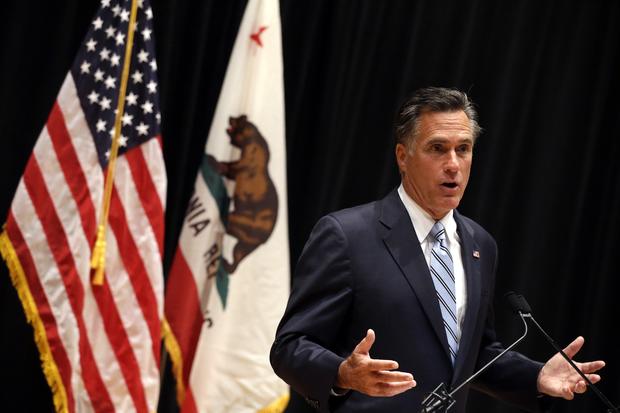Does Romney really hate redistribution?
(CBS News) Over the past two days, Mitt Romney has attacked President Obama over a 1998 video in which the president said,"I actually believe in redistribution, at least at a certain level to make sure that everybody's got a shot."
"He really believes in what I'll call a government-centered society. I know there are some who believe that if you simply take from some and give to others, then we'll all be better off. It's known as redistribution," Romney said in Atlanta Wednesday. "It's never been a characteristic of America. ... I believe the way to lift people and help people have higher incomes is not to take from some and give to others, but to create wealth for all of us."
Whether redistribution is a "characteristic of America" is potentially up for debate, but one thing is clear: It has long been built into the American system of government. The progressive tax code, for example, is a clear example of income redistribution. Under a progressive tax system, the more money you make, the higher tax rate you are expected to pay - at least in theory. (As the Buffett Rule debatehas illustrated, it doesn't always play out that way.) You can also find redistribution in means-tested entitlement programs like welfare, Medicaid, and food stamps, which are funded by all taxpayers but available primarily to the poor.
"There's plenty of redistribution in the system already," said economist Dan Mitchell, senior fellow at the Libertarian CATO Institute. "We have one of the most progressive tax systems in the world."
Taking redistribution out of the system would mean, at the very least, replacing the progressive tax code with a flat tax and eliminating means-tested entitlements. Asked if Romney advocates taking those steps, campaign spokeswoman Andrea Saul responded in an email: "This election presents a clear choice between Barack Obama's vision of a government-centered society and Mitt Romney's vision of an opportunity society."
"Governor Romney will spur economic growth and create more wealth, while President Obama believes in redistributing wealth," she added.
It's worth noting that Romney has also criticized Mr. Obama on one specific program that falls under the "redistribution" umbrella: Welfare. Romney alleges that the president has gutted welfare to work requirements, suggesting Mr. Obama has instituted policies in which the government will "just send you your welfare check." (This has been deemed false by fact checkers.) Underlying this criticism is the idea that the president is willing to redistribute your wealth even to those who are unwilling to work for it.
Political economist Nicholas Eberstadt, of the right-leaning American Enterprise Institute, suggested that Romney's attacks on redistribution are grounded in an appeal to the American belief "that anybody can start at the bottom and rise to the top" - that any American can pull themselves up by their bootstraps if they are willing to do the hard work, like the characters in the Horatio Alger novels of the 19th century. Romney has reason to believe this message will resonate: A Gallup poll out this week foundthat a majority of Americans believe government is meddling too much in American lives. And redistributing wealth from one person to another would certainly qualify as meddling.
Yet there is a disconnect between the emotional appeal embedded in Romney's anti-redistribution rhetoric and the reality of the American way of life. Polls show that Americans do not favor the institution of a flat tax or the elimination of programs like Medicaid - indeed, two in three want Medicaid expanded. People seem to like some degree of redistribution in practice, even if they might oppose it in theory. Both Eberstadt and Mitchell said they did not believe Romney's comments should be taken to mean he opposes all redistribution.
"It's not that people are necessarily against the level of redistribution we have now," said Mitchell. "It's more that people are concerned that we are on an unsustainable trend that will end badly."
